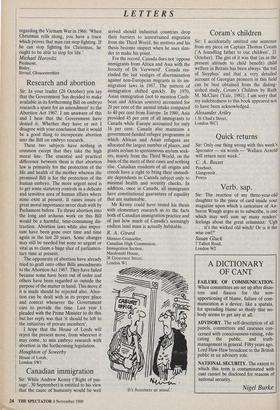Research and abortion
Sir: In your leader (28 October) you say that the Government 'has decided to make available in its forthcoming Bill on embryo research a space for an amendment' to the Abortion Act 1967. I am unaware of this and I hear that the Government have denied it. Whether they have or not I disagree with your conclusion that it would be a good thing to incorporate abortion into the Bill on embryo research.
These two subjects have nothing in common except that they take the high moral line. The essential and practical difference between them is that abortion law is primarily for the protection of the life and health of the mother whereas the promised Bill is for the protection of the human embryo. The more urgent need is to get some statutory controls in a delicate and sensitive area of human affairs where none exist at present. It raises issues of great moral importance never dealt with by Parliament before. To thrust abortion into the long and arduous work on this Bill would be a harmful, time-consuming dis- traction. Abortion laws while also impor- tant have been gone over time and time again in the last 20 years. Some changes may still be needed but none so urgent or vital as to claim a huge slice of parliamen- tary time at present.
The opponents of abortion have already tried to graft onto other Bills amendments to the Abortion Act 1967. They have failed because some have been out of order and others have been regarded as outside the purpose of the matter in hand. This move if it is made should be rejected also. Abor- tion can be dealt with in its proper place and context whenever the Government care to provide the time. Last year I pleaded with the Prime Minister to do this but her reply was that 'it should be left to the initiatives of private members'.
I hope that the House of Lords will reject the present move, from wherever it may come, to mix embryo research with abortion in the forthcoming legislation. Houghton of Sowerby
House of Lords, London SW1
















































 Previous page
Previous page